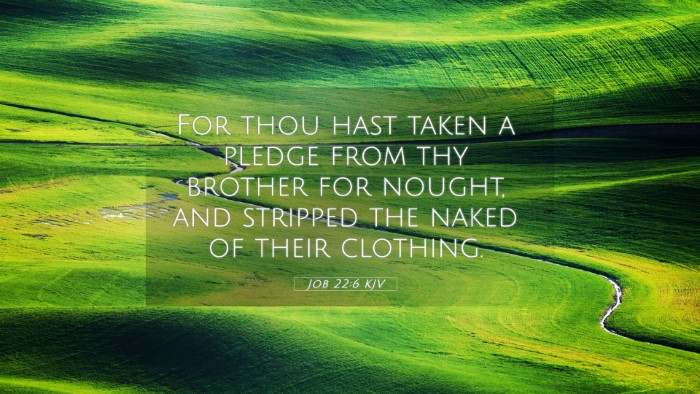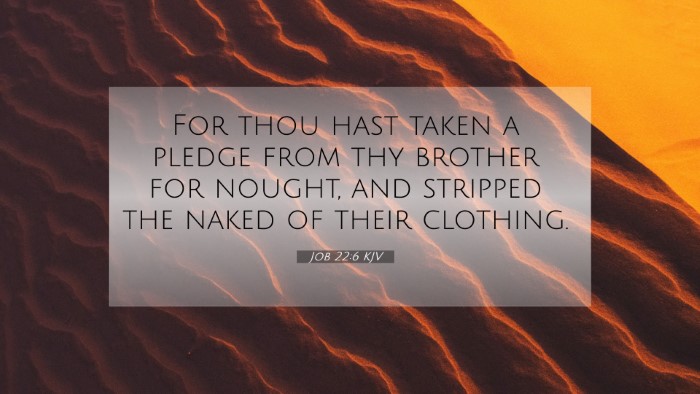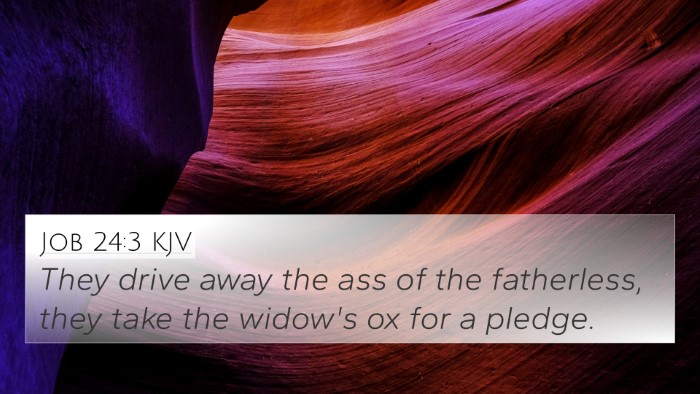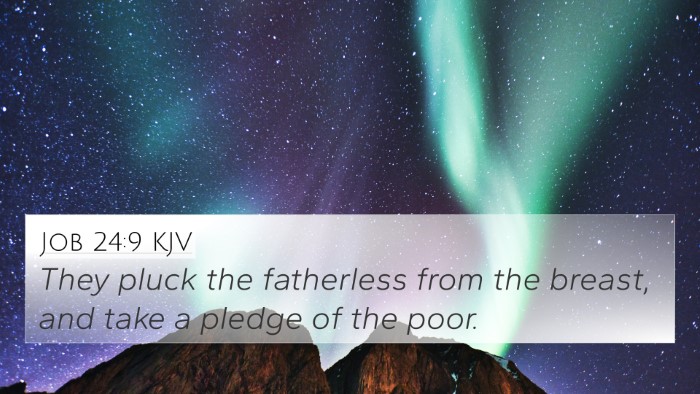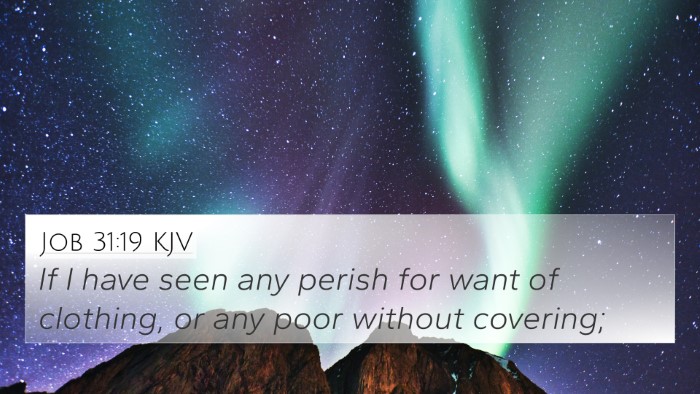Old Testament
Genesis Exodus Leviticus Numbers Deuteronomy Joshua Judges Ruth 1 Samuel 2 Samuel 1 Kings 2 Kings 1 Chronicles 2 Chronicles Ezra Nehemiah Esther Job Psalms Proverbs Ecclesiastes Song of Solomon Isaiah Jeremiah Lamentations Ezekiel Daniel Hosea Joel Amos Obadiah Jonah Micah Nahum Habakkuk Zephaniah Haggai Zechariah MalachiJob 22:6 Similar Verses
Job 22:6 Cross References
For thou hast taken a pledge from thy brother for nought, and stripped the naked of their clothing.
Uncover the Rich Themes and Topics of This Bible Verse
Listed below are the Bible themes associated with Job 22:6. We invite you to explore each theme to gain deeper insights into the Scriptures.
Job 22:6 Cross Reference Verses
This section features a detailed cross-reference designed to enrich your understanding of the Scriptures. Below, you will find carefully selected verses that echo the themes and teachings related to Job 22:6 KJV. Click on any image to explore detailed analyses of related Bible verses and uncover deeper theological insights.
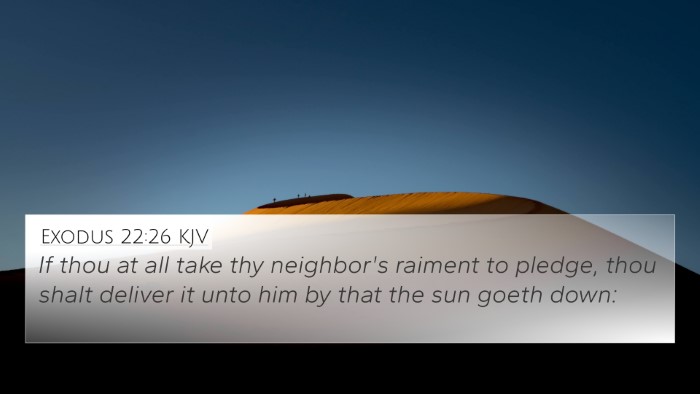
Exodus 22:26 (KJV) »
If thou at all take thy neighbor's raiment to pledge, thou shalt deliver it unto him by that the sun goeth down:
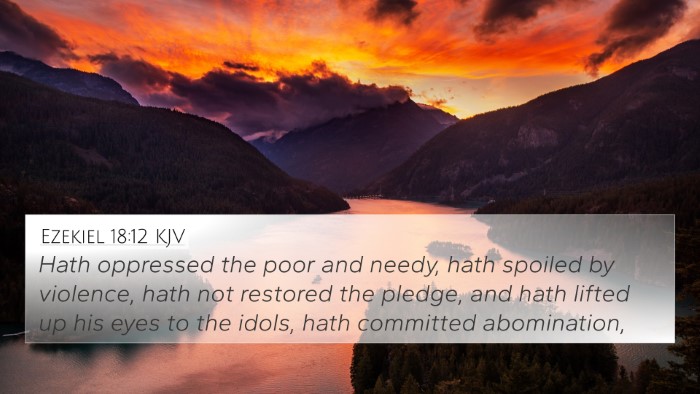
Ezekiel 18:12 (KJV) »
Hath oppressed the poor and needy, hath spoiled by violence, hath not restored the pledge, and hath lifted up his eyes to the idols, hath committed abomination,

Ezekiel 18:16 (KJV) »
Neither hath oppressed any, hath not withholden the pledge, neither hath spoiled by violence, but hath given his bread to the hungry, and hath covered the naked with a garment,
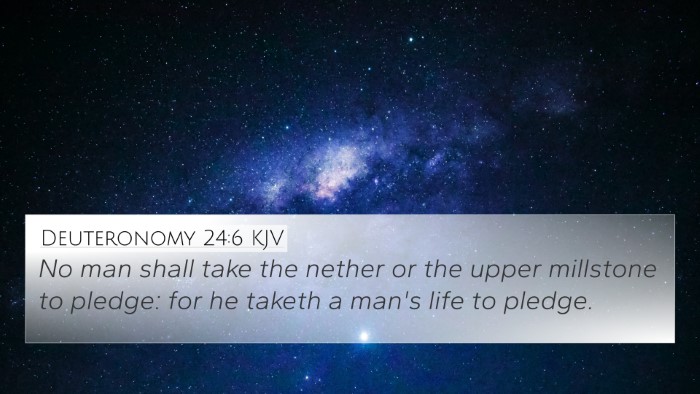
Deuteronomy 24:6 (KJV) »
No man shall take the nether or the upper millstone to pledge: for he taketh a man's life to pledge.

Deuteronomy 24:10 (KJV) »
When thou dost lend thy brother any thing, thou shalt not go into his house to fetch his pledge.
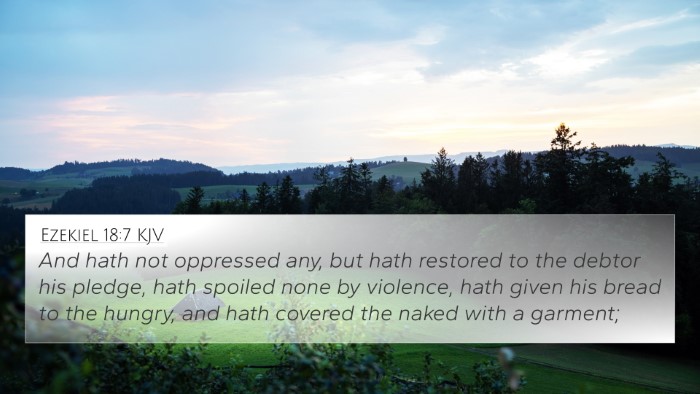
Ezekiel 18:7 (KJV) »
And hath not oppressed any, but hath restored to the debtor his pledge, hath spoiled none by violence, hath given his bread to the hungry, and hath covered the naked with a garment;
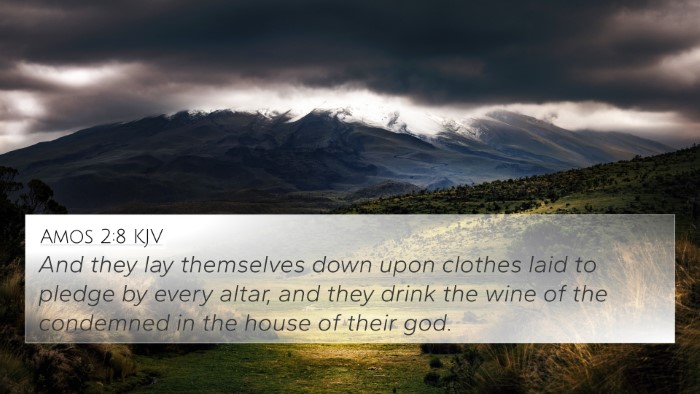
Amos 2:8 (KJV) »
And they lay themselves down upon clothes laid to pledge by every altar, and they drink the wine of the condemned in the house of their god.
Job 22:6 Verse Analysis and Similar Verses
Understanding Job 22:6
Job 22:6: “For you have taken pledges of your brother for nothing, and stripped the naked of their clothing.”
This verse is spoken by Eliphaz the Temanite, one of Job's friends, who accuses Job of being unjust and unmerciful. The implications of this verse delve into themes of justice, righteousness, and the moral responsibilities of individuals towards their brethren.
Context and Background
The Book of Job is a profound exploration of suffering, faith, and divine justice. Job, a blameless man, experiences extreme trials, leading to dialogues about the nature of God and suffering. Eliphaz’s speeches attempt to counsel Job but often reflect a rigid theological position, emphasizing retribution.
Commentary Insights
Matthew Henry's Commentary
Matthew Henry highlights that Eliphaz is accusing Job of being an oppressor of the poor and vulnerable. He suggests that the actions described, such as taking pledges and stripping the naked, evoke the biblical principles of justice and mercy, emphasizing the need for compassion towards those in need.
Albert Barnes' Notes
Barnes notes that the focus of this verse is on the ethical misconduct attributed to Job. The implication is that Job’s suffering could stem from his failings in how he treated others, especially in financial dealings and social justice. Barnes emphasizes the collective responsibility of individuals within the community to uphold righteousness.
Adam Clarke's Commentary
Clarke's analysis underscores the gravity of stripping the naked, which symbolizes deep moral failure. He reflects on the cultural context of giving and receiving pledges, illustrating that economic exploitation stands in stark contrast to God’s calls for justice and charity.
Thematic Connections
The verse connects to various themes within Scripture that emphasize justice, mercy, and right living. Below are several cross-references that elucidate these themes:
- Exodus 22:26-27: Addresses the issue of taking a pledge and emphasizes returning garments to the needy.
- Proverbs 22:16: States that oppressing the poor for personal gain leads to impoverishment.
- James 5:1-4: Warns the rich of the coming judgment for exploiting the poor.
- Matthew 25:40: Jesus identifies with the needy and underscores serving them as serving Him.
- Isaiah 58:6-7: Highlights true fasting as loosening the bonds of wickedness and sharing with the hungry.
- Psalms 15:5: Describes the characteristics of a righteous person who keeps their promise regardless of the cost.
- 1 John 3:17: Speaks on the importance of helping those in need, implying love is demonstrated through action.
Cross-Referencing Biblical Texts
The exploration of Job 22:6 reveals a broader scripture context that addresses human behavior, ethics, and divine expectations. As one examines these connections, a clearer understanding of Job’s predicament and God’s principles emerge.
Connecting the Dots
This verse serves as a poignant reminder of our moral obligations towards others. The accusation levied against Job leads to self-reflection about our actions in light of biblical teachings.
Applications for Today
In contemporary settings, this verse encourages believers to scrutinize their dealings with others, especially the vulnerable. It acts as a prompt to consider how we practice faith in everyday interactions, reflecting God's mercy and justice.
Using Cross-Referencing Tools
To deepen your understanding, utilize a bible concordance or a bible cross-reference guide to explore related themes and scriptures. Such tools enhance your study, allowing for a more enriched grasp of the interconnectedness of God's Word.
Conclusion
Job 22:6 is not merely a historical assertion; it is an enduring principle calling for justice and mercy. As we engage with the text, we see the beauty of biblical narratives harmonizing to form a coherent understanding of God’s character and expectations from His people.

